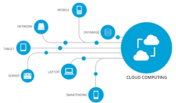Docker malware is now common, so devs need to take Docker security seriously
Source:-https://www.zdnet.com Towards the end of 2017, there was a major shift in the malware scene. As cloud-based technologies became more popular, cybercrime gangs also began targeting Docker and Kubernetes systems. SECURITY Cyber security 101: Protect your privacy from hackers, spies, and the government Cyber security 101: Protect your privacy from hackers, spies, and the government Simple steps can make the difference between losing your online accounts or maintaining what is now a precious commodity: Your privacy. Read More Most of
Read more

